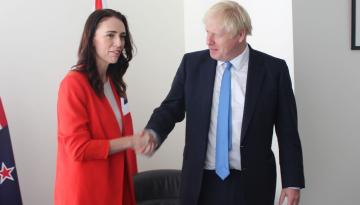New Zealand is "game-ready" and "match-fit" to develop a free trade deal with the United Kingdom, Foreign Minister Winston Peters has told British media.
In June 2016, Brits voted for the UK to leave the European Union, a process known as Brexit. Two Prime Ministers later and after much delay, the UK finally ratified a Brexit agreement earlier this year. Without the tie to the EU, the UK was free to begin trade deal negotiations with New Zealand on June 17.
The UK is New Zealand's sixth-largest trading partner, with two-way trade sitting at almost $6 billion annually. The first round of negotiations are set to take place virtually from mid-July.
Speaking to The Telegraph's Chopper's Politics podcast earlier this week, Peters said New Zealand is "set to go", hoping to secure a "high-quality agreement" with "speed".
He said our experience negotiating other FTAs would prove beneficial.
"We are certainly game-ready because we've had to, as a trading nation, do so much of these deals with other countries in Asia and around the world. In a sense, we are match-fit. When I believe that, because of the tie with the European Union, it is something new for the UK in that context," he said.
Peters said New Zealand had a lot to offer the UK, particularly in terms of food products, while the UK had a lot we wanted, such as in pharmaceuticals and vehicles.
"I hope that the English primary production sector do not see us as competitors. The reality is that we can complement each other and do better internationally."
He said he saw the potential for the UK and New Zealand even before Brexit had been voted on.
"I came to the UK in preparation for the June 23, 2016 referendum and made an address to the House of Lords committee at the time to say it is going to happen and we need to look at the UK's business and commercial and trade relationships around the world," Peters told The Telegraph.
"The UK, naturally, being in the Commonwealth of 2.2 billion people and over 50 countries, this was, I believe, then an opportunity to start working on the UK's reemergence in the world of going global so to speak.
"Then there were countries like New Zealand and Australia which are seriously natural partners where we have got, across the divide, seasonal differences, so we are not competing with the UK in so many ways. We have got trade, education, science, cultural, people-to-people ties, and above all, democracy and the rule of law."
He said it's the UK's chance to "reconnect" with emerging economies after being tied to the EU and an opportunity for the Commonwealth to take off as an economic bloc.
"When countries like India get to understand, and this is a seriously emerging economy of 1.4 billion people, when they realise it is in their interests to be part of a wider association, and there are countless other countries like that as well - Canada, Australia, New Zealand, are all in the same boat here - it just gives us greater leverage to facilitate the opportunities and the strengths of different sectors in all of our countries. We will do better by all doing better trade together."
Peters also spoke of how he picked that Brexit would happen, despite most in the UK thinking Brits would vote to stay in the EU.
"I don't believe the polls and believe that I could read, from what I knew, that out there, particularly in the Labour electorates, there was a massive disconnect between the Labour constituency and the Labour Party, and it showed in the polls as well.
"I had the benefit of the best pollsters that I know. I got into some London taxi cabs and I asked the driver what he thought."
In launching the negotiations, Trade Minister David Parker said New Zealand was beginning a process with "one of our oldest friends".
"As the global economy continues to be severely impacted by the effects of COVID-19, we are more committed than ever to concluding a bilateral FTA capable of delivering significant benefits to the people of both New Zealand and the UK," he said.
UK Prime Minister Boris Johnson welcomed the talks by posting a video on Twitter.
"There's so much we already do. I mean let's face it, we buy colossal quantities of New Zealand win - fantastic Oyster Bay - we watch the orcs and hobbits we think come from New Zealand," Johnson said.
"We export gin, we export buses to New Zealand - but frankly there's so much more we could do together, from agriculture to services."
However, documents from the UK's Department for International Trade (DIT) reveal that a deal with New Zealand could reduce the UK's GDP by 0.01 percent. A best-case scenario would see GDP boosted by 0.01 percent in the long term. New Zealand's GDP would see growth of up to 0.35 percent, according to the DIT. Gross Value Added (GVA) would likely increase.
The UK is also pursuing a deal with Australia. DIT documents found that deal will boost UK GDP growth by between 0.01 percent and 0.03 percent.



